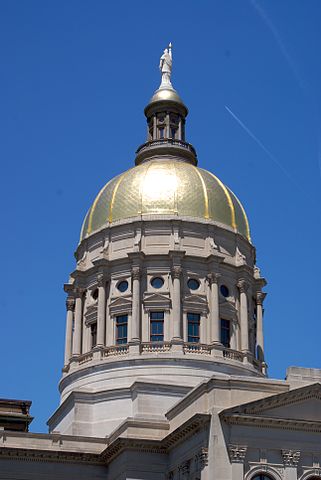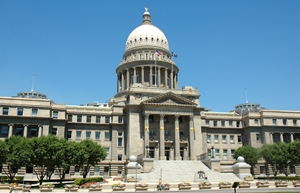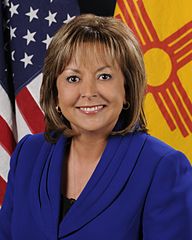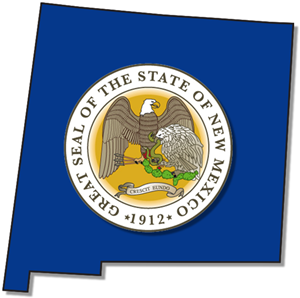April 7, 2017 •
News You Can Use Digest – April 7, 2017
Federal: DOJ Renews Promise of Action on Lobbying Law Compliance Bloomberg BNA – Kenneth Doyle | Published: 4/5/2017 The Government Accountability Office’s (GAO) annual report on Lobbyist Disclosure Act (LDA) compliance noted the Justice Department expects to take action on […]

Federal:
DOJ Renews Promise of Action on Lobbying Law Compliance
Bloomberg BNA – Kenneth Doyle | Published: 4/5/2017
The Government Accountability Office’s (GAO) annual report on Lobbyist Disclosure Act (LDA) compliance noted the Justice Department expects to take action on four “chronic offenders” of the law. The report said House and Senate officials in charge of administering the LDA have referred thousands of cases of noncompliance, but the U.S. attorney’s office has been able to resolve only about half of these cases through letters and other contacts seeking compliance. The GAO said officials believe many of those who fail to file disclosure reports are no longer lobbying. But more than 1,300 referrals regarding failure to file lobbying reports remained unresolved last year. Meanwhile, another 700 referrals for failing to file required reports on lobbyists’ political contributions also remained unresolved.
Ethics Panel Opens Investigation into Nunes
The Hill – Cristina Marcos and Katie Bo Williams | Published: 4/6/2017
House Intelligence Committee Chairperson Devin Nunes (R-Calif.) temporarily recused himself from all matters related to the panel’s ongoing probe into Russia’s interference in the presidential election. The House ethics committee released a statement saying it would investigate allegations that “Nunes may have made unauthorized disclosures of classified information, in violation of House rules, law, regulations, or other standards of conduct.” Nunes has come under fire for going to the White House grounds to meet with a secret source and view documents he said suggest President Trump and his transition team members’ identities may have been improperly revealed in reports on surveillance of foreign targets.
Former Trump Staffers Hunt for Foreign Lobbying Work
Politico – Theodoric Mayer, Kenneth Vogel, and Josh Dawsey | Published: 4/3/2017
Some of President Donald Trump’s former campaign hands are rushing to sign lucrative deals with foreign clients, shrugging off their own pledges to avoid foreign lobbying and the president’s vow to “drain the swamp.” Former Trump campaign manager Corey Lewandowski’s firm is one a handful of upstarts looking to undercut the lobbying giants that for years dominated the market for foreign lobbying work in Washington. They are betting their experience on Trump’s campaign and relationships with former colleagues now in his administration can woo foreign governments away from more established rivals.
Trump Can Quietly Draw Money from Trust Whenever He Wants, New Documents Show
Washington Post – Drew Harwell | Published: 4/3/2017
The trust agreement that Donald Trump used to put his adult sons in charge of his company allows him to draw money from it upon his request, illustrating the thin divide between the president and his private fortune. Trump and his attorneys have pointed to the Donald J. Trump Revocable Trust as a response to widespread worries from ethics lawyers, who have said the president’s refusal to divest ownership of his company creates the potential that he can derive personal profit from his public office. Trump’s trust is not “blind” because he knows how his assets are performing, has close relationships with both trustees, can make money off the trust’s financial interests, and can revoke the trust at any time.
From the States and Municipalities:
Alabama – Ethics Commission Finds Probable Cause Against Gov. Robert Bentley
AL.com – Mike Cason | Published: 4/5/2017
Gov. Robert Bentley could face criminal prosecution after the Alabama Ethics Commission found probable cause he broke ethics and campaign finance laws in a sex-tinged scandal that has engulfed him for over a year. The commission voted to refer four issues to the Montgomery County district attorney’s office, which will decide whether to pursue charges. The commission found probable cause to believe Bentley had misused state resources and campaign funds, improperly accepted a campaign donation outside of an allowed fundraising window, and lent himself campaign money when he was not a candidate. Bentley has been under scrutiny since recordings surfaced last year of him making suggestive remarks to a female aide before his divorce.
Arizona – Arizona Secretary of State’s Website to Track Political Spending Triples in Cost
Arizona Republic – Mary Jo Pitzl | Published: 3/29/2017
It was a key talking point of her 2014 campaign for secretary of state: Michele Reagan would build a website to allow the public to track the money spent in political campaigns, from the governor’s office down to the smallest town-council race. But the much-touted See the Money website has yet to materialize, despite a nearly $500,000 investment, a now-completed contract with an outside firm, and a string of promised due dates. Reagan said she is moving the project in-house and is determined to have it online by January.
Colorado – A Dark Money Lawsuit, a Colorful Cast of Characters, and Colorado’s Citizen Campaign Finance Cop
Colorado Independent – Corey Hutchins | Published: 4/4/2017
The best drama in Colorado politics is not occurring at the Capitol, but in a courtroom. The characters in the dispute are half the intrigue. At issue is the question of whether it is legal for someone to set up a nonprofit to shield donors from disclosure even when that nonprofit works almost exclusively, through an affiliated entity, on campaigns for or against candidates. In Colorado, anyone who lodges a complaint about a suspected campaign finance violation has to prove his or her own case against an alleged violator in a courtroom setting. It is a system its critics say discourages average citizens from bringing complaints against powerful people or well-funded groups.
Florida – Hillsborough Commissioners Add Themselves to New Lobbying Ordinance
SaintPetersBlog.com – Mitch Perry (Florida Politics) | Published: 4/5/2017
Registered lobbyists can no longer text or email Hillsborough County commissioners during meetings. Lobbyists who violate the new ordinance can be punished with a ban of up to a year, though it would take four violations to reach that. Commissioners that violate the ban and do not report communications sent to them during meeting will be punished with a $250 fine on the first offense and $500 on the second. If a third violation occurs, the Florida Commission on Ethics will be notified.
Kansas – These High School Journalists Investigated a New Principal’s Credentials. Days Later, She Resigned.
Washington Post – Samantha Schmidt | Published: 4/5/2017
A group of reporters and editors from the student newspaper, the Booster Redux at Pittsburg High School in Kansas, had gathered to talk about Amy Robertson, who was hired as the high school’s head principal on March 6. The student journalists had begun researching Robertson, and quickly found some discrepancies in her education credentials. When they researched Corllins University, the private university where Robertson said she got her master’s and doctorate degrees, the website did not work. They found no evidence it was an accredited university. The students began digging into a weeks-long investigation that would result in an article questioning the legitimacy of the principal’s degrees and of her work as an education consultant. Robertson resigned four days later.
Maine – Lying-to-Legislature Bill Narrowed to Apply to Lobbyists Only
Portland Press Herald – Kevin Miller | Published: 4/3/2017
A legislative committee voted in favor of a bill to make it a crime for lobbyists to lie to Maine lawmakers after narrowing a bill to exclude the public, and themselves. Maine is one of nine states that have no laws against providing false information in committee. Fifteen states plus the District of Columbia prohibit lobbyists from providing false testimony, and some states require speakers to take an oath before testifying in committee.
North Carolina – Lawmakers Revive Plan for Combined State Elections, Ethics Board
WRAL – Matthew Burns | Published: 4/4/2017
House Republicans would prefer changing a law struck down by a three-judge panel related to overseeing North Carolina elections instead of extending a court fight with new Gov. Roy Cooper. A new measure approved by the Elections Committee would rework an eight-member state panel overseeing both elections and ethics rules the judges threw out as unconstitutional and give more control over the board to Cooper. The revised bill would still merge the elections and ethics boards, but the governor would be able to appoint all members from nominations made by the state Republican and Democratic parties. The board would be split evenly between the two parties.
Pennsylvania – Have Bribery, Fraud and Abuse of Power Become Synonymous with ‘Pennsylvania’?
PennLive.com – Jan Murphy | Published: 3/30/2017
Pennsylvanians have witnessed scores of corruption cases involving state officials from both sides of the political aisle and all three state governmental branches. Whether it is on a per-capita basis or simply the sheer number of high-profile corruption cases in recent years, Muhlenberg College political scientist Chris Borick said it is obvious that “something is pretty wrong in our political system in terms of corruption.” Some blame it on lax rules that do not hold government officials accountable or lawmakers’ failure to enact reform laws such as a ban on gifts or limits on campaign contributions. Though watchdogs continue to seek such reforms, little progress has been made in the Legislature.
Tennessee – Analysis: Possible double dipping at Tennessee statehouse
The Tennessean – Dave Boucher and Joel Ebert | Published: 3/31/2017
A review of campaign finance reports filed in 2016 by all 131 current Tennessee lawmakers found state representatives and senators spent $189,700 combined in campaign money on expenses that may have been paid for by state funds. But lawmakers are not required to report specific dates and locations of smaller purchases that are typically less than $100. That makes it unclear how many of those expenses also may have been reimbursed by the state, providing the opportunity to obscure double dipping or other financial abuse.
Tennessee – Nashville’s Private Club with a PAC
The Tennessean – Joel Ebert and Dave Boucher | Published: 4/2/2017
Many nights, the most powerful Tennessee lawmakers imbibe and eat at The Standard, a restaurant a few blocks from the Capitol. Often, it is at the expense of their campaign donors. An analysis found 25 Tennessee legislators and one prominent Nashville elected official, or their PACs, combined with seven other state PACs to spend $150,000 from their campaign coffers at the restaurant and club since 2009. More than $50,000 of that money was spent by elected officials to pay for their personal memberships in the club. The Standard also operates its own state PAC, which has donated almost $100,000 to state and local leaders who are members or who frequent the club.
Vermont – Vermont’s Campaign Finance Law Survives Legal Challenge
U.S. News & World Report; Associated Press – | Published: 4/3/2017
A challenge to Vermont’s campaign finance laws has been struck down in federal court. Dean Corren, an unsuccessful candidate for lieutenant governor, sued the state for violating his First Amendment rights, alleging a restriction on fundraising for publicly financed candidates is unconstitutional.
 State and Federal Communications produces a weekly summary of national news, offering more than 60 articles per week focused on ethics, lobbying, and campaign finance.
State and Federal Communications produces a weekly summary of national news, offering more than 60 articles per week focused on ethics, lobbying, and campaign finance.
April 6, 2017 •
Thursday’s Government Relations and Ethics News
Campaign Finance Colorado: “A Dark Money Lawsuit, a Colorful Cast of Characters, and Colorado’s Citizen Campaign Finance Cop” by Corey Hutchins for Colorado Independent Ethics “It’s Plausible Trump Incited Violence, Federal Judge Rules in OK’ing Lawsuit” by Eliott McLaughlin for […]

Campaign Finance
Colorado: “A Dark Money Lawsuit, a Colorful Cast of Characters, and Colorado’s Citizen Campaign Finance Cop” by Corey Hutchins for Colorado Independent
Ethics
“It’s Plausible Trump Incited Violence, Federal Judge Rules in OK’ing Lawsuit” by Eliott McLaughlin for CNN
“How the U.S. Ethics Chief Took on Trump and Became a Reluctant Washington Hero” by David Montgomery for Washington Post
“Russian Spies Tried to Recruit Carter Page Before He Advised Trump” by Adam Goldman for New York Times
Kansas: “These High School Journalists Investigated a New Principal’s Credentials. Days Later, She Resigned.” by Samantha Schmidt for Washington Post
North Carolina: “Lawmakers Revive Plan for Combined State Elections, Ethics Board” by Matthew Burns for WRAL
Legislative Issues
Minnesota: “House DFL Leader Won’t Back Down from ‘White Male Card Game’ Remarks” by Brian Bakst for Minnesota Public Radio
Lobbying
Florida: “Hillsborough Commissioners Add Themselves to New Lobbying Ordinance” by Mitch Perry (Florida Politics) for SaintPetersBlog.com
Texas: “Jet Setting Liquor Regulators Could See Wings Clipped by Lawmakers” by Jay Root for Texas Tribune
Lawmakers are back to work attempting to combine state elections and ethics boards after a three-judge panel ruled that the General Assembly overstepped its state constitutional authority when it adopted Senate Bill 4 establishing a bipartisan board to oversee elections […]
 Lawmakers are back to work attempting to combine state elections and ethics boards after a three-judge panel ruled that the General Assembly overstepped its state constitutional authority when it adopted Senate Bill 4 establishing a bipartisan board to oversee elections and consider ethics complaints and issues.
Lawmakers are back to work attempting to combine state elections and ethics boards after a three-judge panel ruled that the General Assembly overstepped its state constitutional authority when it adopted Senate Bill 4 establishing a bipartisan board to oversee elections and consider ethics complaints and issues.
The House Elections Committee approved changes to Senate Bill 68 to remove the bill’s original content relating to school attendance, replacing it with a reworked proposal to create a Bipartisan State Board of Elections and Ethics Enforcement.
Senate Bill 68 would merge the elections and ethics boards, but the governor would be able to appoint all members from nominations made by North Carolina’s Republican and Democratic parties. The board would be split evenly between the two parties.
Senate Bill 68 is set for a floor vote in the House on April 5.
March 31, 2017 •
Kentucky Legislature Adjourns 2017 Regular Session
The Kentucky General Assembly adjourned the 2017 regular session sine die on March 30, 2017. Working late into the evening, lawmakers approved several bills to send to Gov. Matt Bevin’s desk. The Republican-controlled legislature passed right-to-work and anti-abortion bills, as […]
 The Kentucky General Assembly adjourned the 2017 regular session sine die on March 30, 2017. Working late into the evening, lawmakers approved several bills to send to Gov. Matt Bevin’s desk.
The Kentucky General Assembly adjourned the 2017 regular session sine die on March 30, 2017. Working late into the evening, lawmakers approved several bills to send to Gov. Matt Bevin’s desk.
The Republican-controlled legislature passed right-to-work and anti-abortion bills, as well as a repeal of a prevailing wage law.
Stronger controls over prescription pain medication and penalties for trafficking synthetic opioids were also approved.
The next legislative session begins in January, 2018.
March 31, 2017 •
Georgia Legislature Adjourns 2017 Regular Session
The Georgia Legislature adjourned the 2017 regular session sine die yesterday, March 30, 2017. In the final days of the session, lawmakers tackled issues such as a campus gun bill, tax credits, and medical marijuana. Georgia is one of 17 […]
 The Georgia Legislature adjourned the 2017 regular session sine die yesterday, March 30, 2017.
The Georgia Legislature adjourned the 2017 regular session sine die yesterday, March 30, 2017.
In the final days of the session, lawmakers tackled issues such as a campus gun bill, tax credits, and medical marijuana.
Georgia is one of 17 states prohibiting guns on university campuses and Gov. Nathan Deal has shown his opposition to the issue, particularly by vetoing a similar bill last year.
March 30, 2017 •
Idaho Legislature Adjourns 2017 Session
The Idaho Legislature adjourned the 2017 regular session sine die on March 29, 2017. Major issues of this year’s session included proposed income tax cuts and funding for public schools. A handful of legislators will work through the interim on […]
 The Idaho Legislature adjourned the 2017 regular session sine die on March 29, 2017.
The Idaho Legislature adjourned the 2017 regular session sine die on March 29, 2017.
Major issues of this year’s session included proposed income tax cuts and funding for public schools.
A handful of legislators will work through the interim on updating the state’s public school funding formula. Many argue it is outdated and does not meet the needs of a modern education.
March 28, 2017 •
West Virginia Campaign Finance Bill Passes Senate
On March 27, the West Virginia Senate voted to approve a bill to overhaul campaign finance laws. Senate Bill 539 will raise campaign contribution limits to allow individuals to donate up to $2,700 to candidates for statewide office per election […]
 On March 27, the West Virginia Senate voted to approve a bill to overhaul campaign finance laws.
On March 27, the West Virginia Senate voted to approve a bill to overhaul campaign finance laws.
Senate Bill 539 will raise campaign contribution limits to allow individuals to donate up to $2,700 to candidates for statewide office per election cycle. Individuals would also be able to contribute up to $5,000 to PACs per year and $10,000 to state parties and caucus campaign committees per year.
The bill also proposes changes to disclosure requirements, allowing citizens to donate up to $1,000 to certain PACs that do not donate to individual candidates or their committees before the donor’s identity must be disclosed.
The bill now moves to the House for consideration.
March 28, 2017 •
Tuesday’s Government Relations and Ethics News
Campaign Finance Illinois: “Court Strikes Down Ban on Campaign Contributions from Medical Marijuana Licensees” by Jacob Huebert for Illinois Policy Pennsylvania: “Judge Mid-Trial Dismisses All Charges in Pennsylvania Pay-to-Play Case” by Angela Couloumbis and Craig McCoy (Philadelphia Inquirer) for Pittsburgh […]
 Campaign Finance
Campaign Finance
Illinois: “Court Strikes Down Ban on Campaign Contributions from Medical Marijuana Licensees” by Jacob Huebert for Illinois Policy
Pennsylvania: “Judge Mid-Trial Dismisses All Charges in Pennsylvania Pay-to-Play Case” by Angela Couloumbis and Craig McCoy (Philadelphia Inquirer) for Pittsburgh Post-Gazette
Elections
“Senate Committee to Question Jared Kushner Over Meetings with Russians” by Jo Becker, Matthew Rosenberg, and Maggie Haberman for New York Times
Ethics
Maine: “Bangor City Council’s Ethics Watchdog Group Hasn’t Investigated a Violation in 20 Years” by Danielle McLean for Bangor Daily News
Maryland: “Maryland House Passes First Major Ethics Bill in Over a Decade” by Ian Duncan for Baltimore Sun
Oregon: “Lax Conflicts of Interest Rules Let Oregon Lawmakers Keep Quiet About Their Ties” by Gordon Friedman for Portland Oregonian
Legislative Issues
“Chairman and Partisan: The dual roles of Devin Nunes raise questions about House investigation” by Greg Miller and Karoun Demirjian for Washington Post
New Mexico: “Amending New Mexico’s Convoluted Constitution” by Anna Lande for KUNM
Lobbying
“Trump’s ‘Beachhead’ Teams Host Dozens of Former Lobbyists” by Ashley Balcerzak and Niv Sultan for Center for Responsive Politics
March 28, 2017 •
New Mexico Governor Will Likely Call a Special Session
Despite the 2017 regular session adjourning on March 18th, Gov. Susana Martinez will likely call a special session. Martinez does not like the budget proposed to her by the Legislature and has warned of potential furloughs if a new budget […]
 Despite the 2017 regular session adjourning on March 18th, Gov. Susana Martinez will likely call a special session.
Despite the 2017 regular session adjourning on March 18th, Gov. Susana Martinez will likely call a special session.
Martinez does not like the budget proposed to her by the Legislature and has warned of potential furloughs if a new budget is not passed soon.
The special session date has yet to be determined.
March 27, 2017 •
Wisconsin Legislators Consider Revolving Door Ban
Wisconsin legislators introduced a bill to prohibit lawmakers from lobbying for at least one year after leaving legislative office. The bill, identical to a bill proposed during the last legislative session, was introduced with wide bipartisan support. Current state law […]
 Wisconsin legislators introduced a bill to prohibit lawmakers from lobbying for at least one year after leaving legislative office.
Wisconsin legislators introduced a bill to prohibit lawmakers from lobbying for at least one year after leaving legislative office.
The bill, identical to a bill proposed during the last legislative session, was introduced with wide bipartisan support.
Current state law establishes a revolving door provision for state employees and officials seeking to become lobbyists; the prohibition does not, however, extend to legislators.
March 27, 2017 •
US House Bill – No US Funds for Trump Hotel Stays
A bill introduced in the U.S. House of Representatives earlier this month would prohibit the use of taxpayer funds to pay for food, lodging, or other expenses at hotels owned or operated by any U.S. president. House Bill 1452, the […]
 A bill introduced in the U.S. House of Representatives earlier this month would prohibit the use of taxpayer funds to pay for food, lodging, or other expenses at hotels owned or operated by any U.S. president.
A bill introduced in the U.S. House of Representatives earlier this month would prohibit the use of taxpayer funds to pay for food, lodging, or other expenses at hotels owned or operated by any U.S. president.
House Bill 1452, the “No Taxpayer Revenue Used to Monetize the Presidency Act of 2017,” or the “No TRUMP Act of 2017,” also prohibits any payment for lodging and other travel expenses by the federal government at hotels owned or operated by a president’s relatives.
In his introductory remarks, the bill’s sponsor, Rep. Earl Blumenauer, clearly specified President Trump was the target of the legislation: “Hardly a week goes by without reports of taxpayer-funded trips by the president or his family to one of his family-owned properties throughout the world. These excesses have surpassed anything that this nation has seen before, and this unprecedented abuse of taxpayer dollars demands an additional ethical check on the office of the presidency.”
March 24, 2017 •
News You Can Use Digest – March 24, 2017
Federal: Despite a Trust, Ivanka Trump Still Wields Power Over Her Brand New York Times – Rachel Abrams | Published: 3/20/2017 Ivanka Trump, who moved to Washington saying she would play no formal role in her father’s administration, is now […]

Federal:
Despite a Trust, Ivanka Trump Still Wields Power Over Her Brand
New York Times – Rachel Abrams | Published: 3/20/2017
Ivanka Trump, who moved to Washington saying she would play no formal role in her father’s administration, is now officially setting up shop in the White House. The powerful first daughter has secured her own office on the West Wing’s second floor. She is also in the process of obtaining a security clearance and is set to receive government-issued communications devices. In everything but name, Trump is settling in as what appears to be a full-time staffer in her father’s administration, with a broad and growing portfolio, except she is not being sworn in, will hold no official position, and is not pocketing a salary, her attorney said. Watchdogs immediately questioned whether she is going far enough to eliminate conflicts-of-interest, especially because she will not be automatically subjected to certain ethics rules while serving as a de facto White House adviser.
Ethics Watchdogs Make a Career of It
Roll Call – Kate Ackley | Published: 3/16/2017
Norm Eisen, President Barack Obama’s White House ethics czar, and Richard Painter, an ethics lawyer from the George W. Bush administration, have teamed up to become two of the most vocal critics of President Donald Trump’s conflicts-of-interest. They not only sued the president within days of his inauguration, they have also appeared regularly on television and testified on Capitol Hill. Though government ethics law may seem a lonely pursuit, leading a resistance against the Trump team’s web of potential ethics woes clearly is not. “I never imagined that White House ethics experts would be in such demand,” Eisen said.
From the States and Municipalities:
Florida – Will Legislators Lift the Veil on ‘Dark Money’ in Florida Politics?
Bradenton Herald – Mary Ellen Klas (Miami Herald) | Published: 3/19/2017
In the ramp-up to the annual legislative session, before the self-imposed fundraising ban takes effect, Florida’s most politically powerful corporations seed hundreds of thousands of dollars in campaign cash into the committees of legislators. But getting all the details on who got what is impossible. Florida law allows groups that accept contributions from corporations to legally distribute money to other political committees, including those controlled by legislators, without reporting the original source of the cash. The practice of shielding political spending from public view has fueled the “dark money” trend in politics that has allowed groups to launch political attacks in campaigns without fear of being traced.
Illinois – Emails to Emanuel Raise Questions About Dozens of Possible Lobbying Violations
Chicago Tribune – Bill Ruthhart and Hal Dardick | Published: 3/21/2017
The Chicago Tribune reviewed over 2,600 pages of Mayor Rahm Emanuel’s personal emails, and found 26 instances where lobbyists, corporate executives, and longtime Emanuel associates and campaign donors sought action from, or access to, the mayor or city officials but did not register as a lobbyist or report their contact to the city ethics board. Some of those who sent emails pitching their business said they did not believe their actions qualified as lobbying or they were not familiar with the city’s ethics rules. But if the board determines someone sought to influence City Hall action but did not register as a lobbyist, it can fine the individual $1,000 per day from five days after the initial contact until they register.
Massachusetts – Construction Firm, Owner Pay $150,000 for Campaign Finance Violations
Boston Globe – Frank Phillips | Published: 3/22/2017
A Massachusetts business owner and his construction company have paid $150,000 for disguising the true source of campaign contributions. The Office of Campaign and Political Finance said J. Derenzo Companies gave $37,000 to employees and their family members to reimburse them for donations they made to nine candidates, including Gov. Charlie Baker and former Gov. Deval Patrick. The contributions were reported as coming from the individuals. State law prohibits disguising the true origin of a donation and bans corporate contributions. The company and its owner, David Howe, agreed to pay $125,000 to the state’s general fund. Howe also gave $25,000 to a charity with personal funds as part of the agreement.
Mississippi – Politicians Will See Campaign Spending Curbed
Hattiesburg American – Geoff Pender | Published: 3/22/2017
The Mississippi Legislature passed a campaign finance reform measure that would restrict politicians’ spending campaign money on personal expenses and provide for some enforcement and oversight by the state Ethics Commission. Gov. Phil Bryant is expected to sign the bill into law, to take effect January 1. Experts have called Mississippi’s lack of rules and transparency on campaign money – and allowing it to be used for personal expenses – “legalized bribery,” with special-interest cash making its way into politicians’ pockets after it runs through their campaign accounts. Campaign money is shielded from tax, ethics, bribery, and other laws because it is ostensibly to be used for campaigning and records of it are supposed to be open to the public.
New Mexico – Voters Will Decide Future of State Ethics Commission Proposal
New Mexico Politics – Steve Terrell (Santa Fe New Mexican) | Published: 3/16/2017
New Mexico voters will decide next year whether to create an independent ethics commission to shore up trust in government after a string of corruption scandals. The Legislature approved a constitutional amendment that calls for creating a seven-member body to investigate ethics violations and apply sanctions. The vote capped a decades-long effort by government watchdog groups and select lawmakers to put ethics complaints in the hands of an independent authority.
New York – Lobbyist in Libous Case Reaches $10k Settlement, as Legal Questions Remain
Albany Times Union – Chris Bragg | Published: 3/17/2017
Lobbyist Fred Hiffa, whose firm made payments to a law firm employing the son of late New York Sen. Thomas Libous at a time it regularly lobbied the once-influential politician, agreed to pay $10,000 to settle ethics charges. The Joint Commission on Public Ethics (JCOPE) said Hiffa arranged for payments totaling $50,000 over one year to the law firm that employed Libous’ son. Libous was convicted of lying to the FBI about his son’s arrangement. But some legal experts said the gift ban law at the center of JCOPE’s case does not seem to apply to the Libous matter, as well as the case of former Sen. Dean Skelos, who was convicted on corruption charges relating to companies hiring his son.
New York – No Charges, but Harsh Criticism for Mayor de Blasio
New York Times – William Rashbaum | Published: 3/16/2017
Prosecutors said New York City Mayor Bill de Blasio and his aides will not face criminal charges for their role in soliciting donations for the mayor’s campaign and an affiliated nonprofit group, the Campaign for One New York. The investigation involved accusations that de Blasio and his aides gave favorable treatment to donors who contributed to his 2013 mayoral election campaign. Also at issue is whether the de Blasio team illegally raised money for several key state senate races. Acting U.S. Attorney Joon Kim said the decision not to file charges was based, among other things, on the high burden of proof required in prosecuting serious public corruption cases, the clarity of existing law, and the difficulty in proving criminal intent in corruption schemes where there is no evidence of personal profit.
North Carolina – Judges Issue Split Ruling on NC Governor-Legislature Power Struggle
Charlotte Observer – Anne Blythe (Raleigh News & Observer) | Published: 3/17/2017
A three-judge panel delivered a mixed decision in the power struggle between Gov. Roy Cooper and legislative leaders in North Carolina. The General Assembly passed two laws that require Senate confirmation of Cooper’s cabinet secretaries, cut the number of state positions to which the governor can appoint supporters, and overhauled the structure of North Carolina’s state and county elections boards. The panel agreed with Cooper that the law calling for combining the State Board of Elections and the State Ethics Commission was unconstitutional. The judges also ruled that a provision cutting the number of at-will policy-making and managerial positions in Cooper’s administration should be blocked. The judges upheld the Senate’s right to confirm the governor’s cabinet secretaries, saying Cooper has not demonstrated his administration will be hurt by the law.
Oklahoma – Oklahoma State Senator Faces Charges and Condemnation
New York Times – Matthew Haig | Published: 3/17/2017
Oklahoma Sen. Ralph Shortey was accused in a child prostitution case of offering to pay a 17-year-old boy for sex. Shortey was charged with three felony counts one week after police found him with the teenager in a hotel room. The maximum punishment, if convicted, is 25 years in prison. The Senate voted to punish Shortey for “disorderly behavior.” The unanimous vote stripped him of most of his privileges at the Capitol, including his office and parking space.
Pennsylvania – D.A. Seth Williams Indicted on Corruption, Bribery-Related Charges
Philadelphia Inquirer – Jeremy Roebuck, David Gambacorta, and Chris Brennan | Published: 3/21/2017
Philadelphia’s top prosecutor was charged with taking more than $160,000 in luxury gifts, Caribbean trips, and cash, often in exchange for official favors that included help with a court case, according to a bribery and extortion indictment. Federal prosecutors said District Attorney Seth Williams also spent $10,000 from a joint account he shared with a relative meant for the relative’s nursing home costs. The indictment caps a nearly two-year investigation into Williams’ financial affairs. In January, the city Board of Ethics imposed its largest fine ever, $62,000, on Williams for failing to disclose gifts and sources of income, and accepting gifts from prohibited sources.
Pennsylvania – Former Top Allentown Bureaucrat Francis Dougherty Pleads Guilty, Implicates Mayor
Allentown Morning Call – Emily Opilo | Published: 3/22/2017
Former Allentown Managing Director Francis Dougherty pleaded guilty to a conspiracy charge in an ongoing FBI “pay-to-play” corruption probe. Prosecutors say Dougherty helped rig a $3 million contract to replace the city’s streetlights so it would go to a company whose executives and consultants gave thousands of dollars in campaign contributions to Mayor Ed Pawlowski. The mayor has not been charged, but he matches the description of the unnamed public official in court papers. As part of his plea deal, Dougherty must continue to cooperate with prosecutors concerning his knowledge of and participation in political corruption in Allentown.
South Carolina – Veteran State Sen. Courson of Columbia Suspended from Office after Misconduct Indictment
The State – John Monk | Published: 3/16/2017
One of South Carolina’s longest-serving senators has been indicted on ethics charges tied to veteran powerbroker Richard Quinn. A grand jury indicted Sen. John Courson on misconduct in office and using campaign donations for personal expenses. All three charges are tied to Courson’s payments to Quinn’s political consulting firm. Lt. Gov. Kevin Bryant suspended Courson pending the case’s resolution. The indictments allege Courson gave Quinn’s firm nearly $248,000 and received back nearly $133,000 for personal use. The Quinn firm has not been charged with any wrongdoing.
Texas – Dallas City Council Overhauls Ethics Rules; Mayor Mike Rawlings Lauds Changes as ‘Remarkable’
Dallas News – Tristan Hallman | Published: 3/22/2017
The Dallas City Council approved changes to the ethics law. The reforms include lowering the gift-reporting threshold to $250, requiring attorneys and law firms representing clients – along with leaders of associations – to register as lobbyists, and prohibiting city council members from discussing ongoing contract bids. Council members voted down several of their colleagues’ attempts to include additional changes. The ordinance will take effect on July 1, 2017.
 State and Federal Communications produces a weekly summary of national news, offering more than 60 articles per week focused on ethics, lobbying, and campaign finance.
State and Federal Communications produces a weekly summary of national news, offering more than 60 articles per week focused on ethics, lobbying, and campaign finance.
March 23, 2017 •
Drug Price Relief Act Expected to Appear on Ohio Ballot
The Ohio Drug Price Relief Act is expected to appear on the ballot in November, 2017. The proposed initiated statute would prohibit the state from purchasing a prescription drug unless the net cost of the drug is equal to or […]
 The Ohio Drug Price Relief Act is expected to appear on the ballot in November, 2017.
The Ohio Drug Price Relief Act is expected to appear on the ballot in November, 2017.
The proposed initiated statute would prohibit the state from purchasing a prescription drug unless the net cost of the drug is equal to or less than the lowest price paid for the drug by the U.S. Dept. of Veterans Affairs (VA).
It could directly impact more than 4 million individuals served by state programs including those on Medicaid, individuals participating in state retirement programs, and those receiving care through other state programs such as the Ohio Bureau of Workers’ Compensation.
Pharmaceutical Research and Manufacturers of America (PhRMA) commissioned Vorys Health Care Advisors (VHCA) and Health Management Associates (HMA) to create an independent and objective analysis of the potential impact of the proposed act.
Results of the analysis show it is highly unlikely the proposed act could be effectively implemented; moreover, it is highly likely it would fail to achieve its purpose and negatively impact non-targeted entities via increased prescription drug costs and limited availability of certain medications.
March 20, 2017 •
New Mexico Legislature Adjourns Sine Die
The New Mexico Legislature adjourned sine die on March 18, 2017. House Joint Resolution 8, which creates an independent ethics commission, passed both houses and will be placed on the 2018 general election ballot for voter approval. Senate Bill 393, a […]
 The New Mexico Legislature adjourned sine die on March 18, 2017.
The New Mexico Legislature adjourned sine die on March 18, 2017.
House Joint Resolution 8, which creates an independent ethics commission, passed both houses and will be placed on the 2018 general election ballot for voter approval.
Senate Bill 393, a bill requiring lobbyists to disclose the cumulative total of expenditures under $100, passed both houses and Gov. Susana Martinez has until April 7, 2017, to sign the bill into law.
State and Federal Communications, Inc. provides research and consulting services for government relations professionals on lobbying laws, procurement lobbying laws, political contribution laws in the United States and Canada. Learn more by visiting stateandfed.com.

